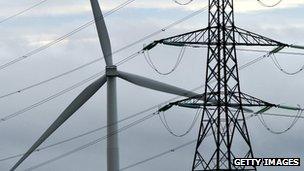National Trust opposes National Grid's pylon plans
- Published

Those opposed to pylons are asking whether cables can be buried
Pylons should not be built in north Wales as part of National Grid plans to extend the electricity infrastructure, the National Trust says.
National Grid is consulting over proposals to transfer power from offshore wind farms and Wylfa B to the electricity network.
The heritage charity said pylons would have an unacceptable impact.
Five initial proposals include laying cables under the sea to Deeside or burying power lines from Anglesey.
Burying lines would cost £1bn more than National Grid's preferred option of pylons and overhead lines between Wylfa and the Pentir substation near Bangor.
National Trust Wales has pressed for the new electricity connection, necessary due to plans for increased energy production in Anglesey and the Irish Sea, to be laid under the sea to avoid any negative impact on the Welsh landscape.
'Nationally important sites'
A spokesperson for the charity said: "But, if the grid choose to go against public opinion and the undersea option is ruled out, then National Trust Wales believes that pylons would have an unacceptable visual, landscape and heritage impact at key sites across the route.
"Not only should new pylons not be erected at nationally important sites like the Menai Straits, and the Dwyryd and Glaslyn Estuaries, but existing pylons across the Menai and Dwyryd should also be removed."
The National Grid is charged to upgrade and extend the electricity infrastructure as part of a £110bn investment in energy in Britain.
- Published21 November 2012
- Published16 November 2012
- Published31 October 2012
- Published4 October 2012